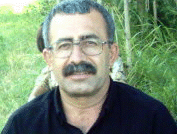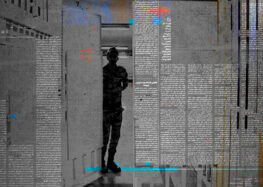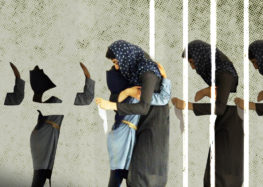Mahmoud Salehi
 (7 April 2008) Mahmoud Salehi completed his one-year prison sentence on March 23, 2008. However, local judiciary officials refused to release him and instead brought new charges against him relating to letters he published while in prison months ago. According to his lawyer, Mohammad Sharif, the new charges are based on letters of thanks Salehi wrote in response to expressions of solidarity he received while in prison. On April 6, 2008, the authorities released Salehi after he posted bail in amount of 400 million Rials ($44,000). He is subject to further prosecution.
(7 April 2008) Mahmoud Salehi completed his one-year prison sentence on March 23, 2008. However, local judiciary officials refused to release him and instead brought new charges against him relating to letters he published while in prison months ago. According to his lawyer, Mohammad Sharif, the new charges are based on letters of thanks Salehi wrote in response to expressions of solidarity he received while in prison. On April 6, 2008, the authorities released Salehi after he posted bail in amount of 400 million Rials ($44,000). He is subject to further prosecution.
Mahmoud Salehi, a bakery worker and trade-union activist from the city of Saqez, has been a target of official persecution and prosecution for his peaceful activities promoting workers’ rights. He is imprisoned in the Western city of Sanandaj and suffers from serious illnesses including kidney failure.
For many years, Salehi has raised workers’ awareness of their internationally protected rights. His efforts to organize May 1st observances have consistently aroused harsh reactions from security and intelligence agents.
Since the mid-1980’s, Salehi has been imprisoned several times. He spent three years in prison in 1986 for his trade-unionist activities. Intelligence agents detained Salehi and three of his colleagues in 1999, holding them for 75 days in solitary confinement. In 2000, after he delivered a speech to members of the Saqez Bakery Workers Association, authorities detained and imprisoned him for 10 months. A few weeks before May Day 2001, intelligence agents detained Salehi again for 12 days.
Salehi and his colleagues persisted in their trade-unionist activities. As they planned to hold a peaceful assembly in Koudak Park in Saqez on May 1, 2004, security forces arrested Salehi and fifty other workers. The officials released most of the detainees except for Salehi and six other workers who were only released 12 days later after posting bond in amount of 200,000,000 Toman ($222,000). The seven detained workers came to be known as the “Saqez Seven.”
On February 1, 2005, Salehi’s trial convened. In addition to charges stemming from the May Day event, the prosecutor brought charges of endangering national security based on an article Salehi wrote, entitled “Preparing a cost of living index for a family of five in Iran.” The indictment also included charges based on a meeting Salehi held with representatives of the International Confederation of Free Trade Unions (ICFTU). On November 9, 2005, the court sentenced Salehi to five years imprisonment and three years of internal exile in the city of Ghorveh. Salehi’s lawyer appealed the sentence.
Salehi’s prosecution caused an international outcry led by international unions such as the ICFTU. In a complaint filed by the ICFTU with the International Labor Organization (ILO), on behalf of Salehi and other prosecuted workers, the ICFTU said it considered Salehi and others were sentenced “for their trade union activities, especially given the fact that the initial arrests were made in connection to their participation in May Day 2004 and that the charges against them were made shortly thereafter.”
In May 2006, an appeals court dismissed Salehi’s sentence issued by the lower court, but also required a new trial to be convened on new charges of “assembly and collusion to act against the internal and external security of the country.” Saqez’s Revolutionary Court took up the new case in November 2006 and sentenced Salehi to four years in prison. Charges relating to Salehi’s writings were referred to a public court.
Finally, an appeals court held a hearing into charges against Salehi on 11 March, 2007. The appeals process violated international standards of due process in that the presiding Judge Sadeghi is the same person who acted as the prosecutor in May 2004 and ordered Salehi’s arrest. The fact that the appeals process was being decided by the prosecutor who initiated Salehi’s prosecution outraged international unions. In a protest letter to the Iranian president, Mahmoud Ahmadinejad, the International Trade Union Confederation (ITUC) wrote: “The way in which Salehi’s case and that of his colleagues were treated can only be seen as an insult to civilized standards in the administration of justice.”
The authorities did not inform Salehi, or his lawyer, of the appeals court’s decision, unexpectedly arresting him a few weeks later. On April 9, 2007, a high ranking intelligence official visited Salehi and summoned him to the prosecutor’s office to discuss issues relating to the upcoming May Day. Once Salehi arrived at the prosecutor’s office, he was instead informed of the appeals court’s verdict of one year imprisonment and a three year suspended sentence. Salehi was immediately arrested and transferred to the Central Prison in Sanandaj. He was denied the right to see his family or contact his lawyer.
Salehi’s health, already fragile at the time of his imprisonment, has deteriorated considerably inside prison. He suffers from heart irregularities, intestinal complications, and kidney failure (he has only one kidney). On December 4, 2007, Salehi was transferred to Tohid hospital in Sanandaj after severe physical and psychological ill-treatment. Since then, prison officials have transferred Salehi to Tohid Hospital at least on three other occasions, the latest on January 17, 2008.
In a February 7, 2008 letter to the UN High Commissioner for Human Rights, Louise Arbour, Salehi’s wife, Najibeh Salehzadeh, appealed for her husband’s health and safety. She wrote that according to physicians at Tohid Hospital “Salehi’s only kidney is losing its functions and that has caused asthma, heart problems, fluctuating blood pressure, dizziness, vessel clogging and the clogging of the heart’s vessels, extreme weakness or fatigue, kidney inflammation, and many other dangerous side-effects.”
Disregard for Salehi’s dangerous health condition is exasperated by the official medical examiners, employed by the government, who refuse to certify his medical conditions. There are very serious concerns for Salehi’s life and safety.






